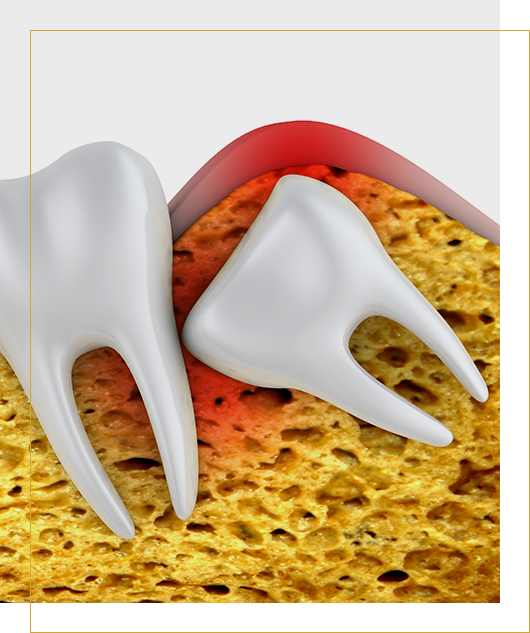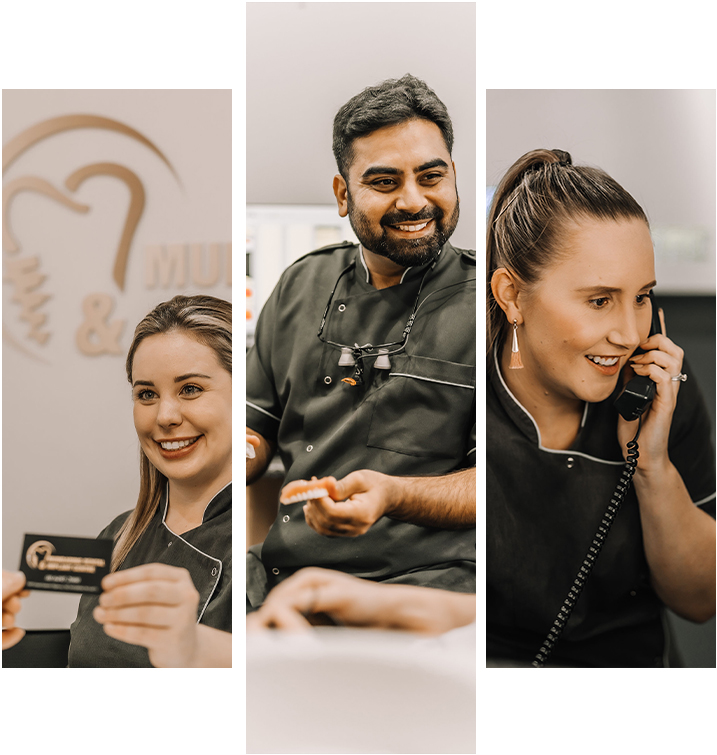Wisdom Teeth Removal in Mundaring
Why wait until your wisdom teeth cause problems? Consult with one of our dentists today and enjoy a positive experience. We’re committed not only to delivering quality care, but also radiant smiles!


Wisdom Teeth Removal is a Safe, Effective, and Painless procedure
Wisdom tooth extraction can be a scary prospect, but it doesn’t have to be.
At Mundaring Dental & Implant Centre, we offer a comfortable and professional experience for wisdom tooth extraction. Our dentists are experienced in this dental procedure and use the latest techniques to ensure minimal pain and quick recovery. We understand that everyone is different, so we offer a range of sedation options to make your experience as comfortable as possible. If you have a problem with your wisdom teeth, it’s essential to get them removed quickly so that infection doesn’t set in, contact us today at 08 6495 2000 to finally redeem yourself from dental pain!
Reasons Why You Need Wisdom Teeth Removal
At Mundaring Dental & Implant Centre, we offer safe and effective wisdom tooth removal to manage current or future problems. From consultation to recovery, our experienced dentists will take care of you every step of the way. Schedule your appointment today!

Oral Cysts: Wisdom teeth are the last thing you want to deal with, but if they’re causing pain and swelling in your mouth or even leading to an oral cyst, then it may be time for them to go! At Mundaring Dental & Implant Centre, we offer comprehensive wisdom tooth extraction to suit your dental requirements.
Damage to Other Teeth: Wisdom teeth are often the last tooth to come in, and they can be susceptible to damage. If you have an infected or impacted wisdom tooth, our dentists at Mundaring Dental & Implant Centre will ensure that your adjacent teeth don’t get hurt by providing a reliable procedure.

Why choose
Mundaring dental
& implant centre

Convenient Quality Dental Care
With over 50 years of combined experience, our team of professionals continues to provide high-quality dental services, from general dentistry and dental implant services to restorative and cosmetic dentistry.

A Compassionate Team Utilizing Modern Technology:
Mundaring Dental & Implant Centre offers the latest dental implant technology and techniques to provide you with the best possible results. Our state-of-the-art equipment makes your dental implant experience as easy and stress-free as possible.

Easily Accessible
Mundaring Dental & Implant Centre is proud to offer flexible payment plan options to make sure that everyone receives the dental care they need.

Same-day Dentistry and Fast Turn Around Time
Mundaring Dental & Implant Centre offers same-day service for various dental treatments, including dental crowns. You can get high-quality dental care and more natural-looking crowns in just one visit!
FAQs
What are the possible problems with Wisdom teeth?
Even though wisdom teeth are not required for everyone, some choose to remove them for a variety of reasons, including the following:
- Pain
- Repeated infection of the soft tissue behind the lower last tooth
- Fluid-filled sacs (cysts)
- Tumours
- Damage to nearby teeth
- Gum disease
- Extensive tooth decay
It’s not always clear when to remove wisdom teeth. So, it’s best to consult your dentist about the position and dental health of your wisdom teeth so they can recommend what’s best for you.
Is the wisdom teeth removal procedure painful?
Can you have all four of your wisdom teeth removed at the same time?
Most dentists prefer to extract all of a patient’s wisdom teeth at once. If only four small, erupted teeth are removed, the surgery will be low-risk and easy. However, if yours are huge and impacted, you may need a more invasive procedure. If this is the case for you, your dentist may have to cut your gums open, file your wisdom teeth down, and extract them piece by piece. Although a more comprehensive treatment is also safe, it might be more painful, take longer, and necessitate additional healing time.
Your dentist will want to take all of your wisdom teeth once if you require general anesthesia. Most patients would also prefer to have it done once and for all rather than having several operations.
Having all of your wisdom teeth extracted on the same day simplifies healing time and minimises the chance of getting dry sockets and infections. However, it is feasible to divide the procedure over two or three appointments; nevertheless, you should follow your dentist’s advice.
Can you drive after wisdom teeth removal?
Most people’s wisdom teeth are the first to undergo extraction, usually not long after their molars have erupted, if at all. In most instances, the removal is relatively similar to any other tooth extraction. Still, in some cases, the intervention is more complex, with the severity of the surgery impacting your driving skills.
Here’s everything you need to know about driving home on your own following wisdom tooth removal at Mundaring Dental & Implant Centre:
The anaesthetic dose applied: There is no reason why you couldn’t drive following the extraction if it’s done under primary local anaesthetic and you feel fine afterwards. However, if the extraction is conducted under deeper sedation. In that case, the sedative administered may impair your ability to drive, so you must arrange for someone to drive you home and refrain from driving for at least 24 hours.
Driving later in the day following local sedation: Even if you are allowed to drive home after surgery, you may feel tired or uncomfortable after the anaesthetic wears off, so you may need to rest for a couple of days.
What to expect during wisdom teeth removal?
The following are the steps for a routine wisdom teeth extraction:
Sedation: There are many levels of sedation available, which can be delivered through nitrous oxide, IV, or general anesthesia. Before you and your dentist decide which sedation level is ideal for you, several criteria are considered, such as the length of the treatment and your unique pain and anxiety tolerance. Most typical wisdom teeth procedures require the dental patient to remain awake, but you should experience no pain.
With IV sedation, the patient drifts in and out of consciousness, and you will most likely have no recollection of the surgery. If the surgery is going to be more intensive or the patient has to be asleep for the whole procedure, some patients will be given general anesthesia.
Numbing: The dentist will begin numbing the areas surrounding the wisdom teeth and the teeth themselves with a local anesthetic after you have been suitably sedated and comfortable.
Tissue extraction: To gain access to the teeth, the dentist will remove any gum tissue covering the area where the wisdom teeth are located.
Bone removal: Based on whether or not your wisdom teeth are impacted, your dentist may need to remove any bone covering the tooth.
The tooth is loosening and being sectioned: The dentist will ensure that any necessary tissue is removed or that the tooth is sectioned off for more straightforward removal.
Tooth extraction: Once the wisdom tooth has become loose or has been sectioned, it is ready to be extracted from the mouth.
Stitches: After the dentist has removed all the required teeth, they will stitch up the tissue around the area and send you home to heal.
Recovery: Typically, the wisdom teeth extraction procedure takes 45 minutes to complete. If you were given nitrous oxide or an IV, you would wake up or recover in the dental chair where the procedure was performed. If you were given general anesthesia, you would awaken in a recovery room. You will be able to go home once you have entirely awakened.
It is generally a good idea to arrange for a ride home from surgery because you will most likely still be feeling the effects of the anaesthetic and should not drive in that condition. We’ll send you home with instructions and pain relievers to assist your healing.
In general, the mouth will not heal entirely for several months, so take care of your wounds and remember that you might still get an infection after surgery if you don’t follow the aftercare instructions.
What are the possible risks with wisdom teeth removal?
In most cases, wisdom teeth extractions don’t cause long-term complications. Surgical removal of impacted wisdom teeth, on the other hand, sometimes necessitates making an incision in the gum tissue and extracting bone. Complications may arise in rare cases and include:
- When the post-surgical blood clot has been lost from the surgical wound, the patient suffers from a painful dry socket or exposure of bone.
- Bacterial infection or stuck food particles in the socket.
- Damage to the adjacent teeth, nerves, jawbone, or sinuses.
How long does it take for the wound to heal?
How to take care of the wound from wisdom teeth removal
The removal of wisdom teeth is a major surgical procedure. Following the post-operative care instructions provided below can help you recover faster after wisdom teeth removal. They can also prevent you from getting infections after wisdom teeth removal by reducing excessive discomfort and swelling.
The professional dentists at Mundaring Dental & Implant Centre recommend that on the day of your wisdom teeth extraction, you:
- You should limit your activities.
- Touching the wound should be avoided.
- Do not swish or gargle vigorously.
- Outside of the surgery site, apply ice to your cheeks.
- Thirty minutes after your surgery, remove the gauze surgical pad.
- Use the suggested pain relievers as soon as you start to experience pain.
What is the estimated cost of wisdom teeth removal?
The complexity of your treatment determines the cost of wisdom teeth removal; the less difficult the treatment is, the less expensive it will be.
The average cost of wisdom teeth removal in Australia can range from $188 to $259 per tooth. According to the 2020 national dental fee survey, a basic extraction with local anaesthesia for all four teeth in Australia can cost $2,322. The cost of wisdom teeth removal under general anaesthesia is also expected to be higher, ranging from $1,500 to $3,000 per tooth.
